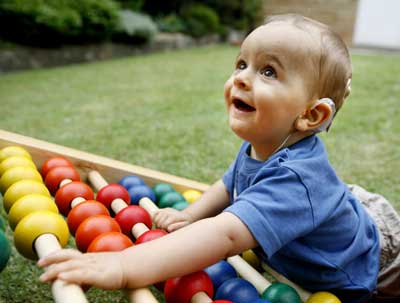Cochlear Implants: After the Surgery
A child who receives cochlear implants has the opportunity to learn to perceive sound and develop speech and language skills. However, he will not be able to use the cochlear implant immediately after surgery. It typically takes three to six weeks for the ear to heal. The ear must heal before the surgeon attaches the external transmitter. Furthermore, it is important to remember that cochlear implants are not a cure for hearing loss. Speech therapy is critical for the best possible outcome. Your child must learn how to use his cochlear implant.
Activation and Programming
Once your child receives the external transmitter, it must be activated and programmed. During the programming session, your child will hear sounds, possibly for the first time (if he was born Deaf.) Upon hearing their first sounds, some children might laugh, others might cry, and others might display no discernible reaction. It will take your child a while to adjust to the new sense. For comparison, think of the first time you gave your child a bath. He might not have known quite what to make of the water at first, but over time he likely grew to enjoy bath time.
Expect the initial programming session to take quite a while. Using a computer, the audiologist will set volume levels designed for your child’s comfort and maximum stimulation. The audiologist must customize the settings for each of the 22 electrodes in the implant. Over the next few weeks and months, as your child becomes accustomed to sounds, the audiologist will fine-tune the device further to enhance quality.
Auditory Rehabilitation
Your child will be able to hear sounds with his cochlear implants, but auditory rehabilitation (also called auditory training or aural rehabilitation) will help him learn to understand it. Speech therapy is a critical part of any successful auditory rehab program.
A speech-language pathologist (SLP) can help your child learn to identify the meanings of sounds, if he has not previously heard sounds. She can also help your child with voice quality. He can learn to regulate his pitch and the nasal quality of his speech. He can learn to articulate sounds, words, and phrases. Speech therapy can also help your child learn to use additional aids to improve his communication experience, such as lip reading.
Parental Support
Parents should meet with the speech therapist to discuss methods for encouraging the child’s adjustment and developing his speech and language skills. Talk frequently with your child throughout the day, ideally in a quiet environment so that he can focus on the conversation. Encourage his interaction with other family members and non-family members. Provide your child with visual cues as he adjusts to new sounds. For example, as you tell your child, “It’s time to go to bed,” point to your watch and fold your hands under your head in a manner that indicates sleep.




